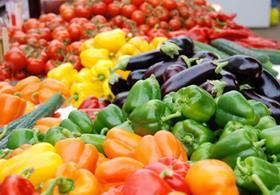
A major new report says fruit and vegetables must be at the centre of the world's future food and environment strategy.
The report from the EAT-Lancet Commission claims the food production system needs to be radically changed to address the particular challenges of the current generation. “The data are both sufficient and strong enough to warrant immediate action,” the authors state. “Delaying action will only increase the likelihood of serious, even disastrous, consequences. It is clear too that a Great Food Transformation will not occur without widespread multi-sector, multi-level action, which must be guided by scientific targets.”
Five key strategies are outlined within the report as central to the way forward. The scientific targets set out by the commission recommend the increased consumption of plant-based foods, including fruit, vegetables, nuts, seeds and wholegrains, while limiting animal-source foods. The authors want national and international commitment towards switching to healthy diets.
At a production level, government must reorient priorities away from simply producing high quantities of food to producing healthy food that also enhances biodiversity, they say.
Thirdly, the report states that the current global food system requires “a new agricultural revolution that is based on sustainable intensification and driven by sustainability and system innovation”. As well as achieving negative emissions globally, the world’s food system must become a net carbon sink from 2040 and onwards.
The strategy also discusses humanity’s responsibility to have strong and co-ordinated governance of land and oceans by implementing a zero-expansion policy of new agricultural land into natural ecosystems and species-rich forests, and underlines the importance of halving food losses and waste in line with UN Sustainable Development goals.
The report concludes: “An unprecedented opportunity exists to develop food systems as a common thread between many international, national and business policy frameworks aiming for improved human health and environmental sustainability.”
Mixed reaction
The report received a predictably mixed reaction, with the livestock sector considerably less supportive than fresh produce.
Joanna Lewis, policy director at the Soil Association, said: “The Soil Association welcomes the major contributiontheEAT-Lancet Commission has made to shattering the myth that agro-ecological farming cannot feed the world. This groundbreaking scientific report makes game-changing recommendations defining the direction of travel towards a sustainable food and farming system to achieve healthy diets for all by 2050.
'This important report must be reflected immediately in government policy, including amending the draft Agriculture Bill to make public health and agro-ecological farming specific objectives, and ensuring adequate support is available for farmers to make the necessary transition.”
NFU vice president Stuart Roberts, however, said the global report needed to be looked at “through a local lens”, and went on to defend the role of red meat within diets. He added that it is “overly simplistic” to target this one food group for a reduction in consumption.
“It is clear that climate change is one of the greatest challenges of our time and British farmers are continuing to take action,” he added. “A combination of policies and practises will be needed to enable farmers to meet their ambitions but we must not forget the impact of a changing climate on food production – we only have to look back to the drought last year to see the effect it can have.”



